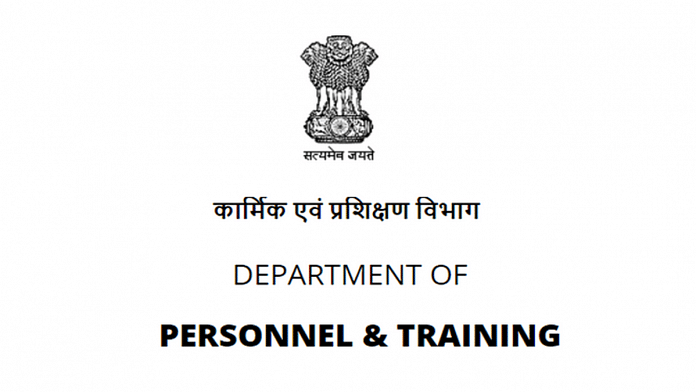New Delhi: India is often said to be steeped in bureaucracy, but the central government is remarkably short on bureaucrats, or at least those from the Indian Administrative Service (IAS). To help address this issue, the Narendra Modi government has formed a four-member committee to analyse the reasons for the shortage and to come up with solutions, sources in the Department of Personnel and Training (DoPT) told ThePrint.
The committee, which is headed by former DoPT secretary C. Chandramouli, will submit its report to the government soon.
According to All India Services (AIS) rules, 22 per cent of the sanctioned strength of IAS officers (6,709) is supposed to be deputed to the Centre. However, currently, only 6 per cent of total sanctioned officers are deputed to the Centre, according to figures in the 2021 annual report of the DoPT, accessed by ThePrint.
This means where there should be 1,451 IAS officers, there are only 445.
Making up the shortfall in IAS officers is unlikely to be a straightforward task.
Also Read: Bid to break ‘IAS monopoly’? Forest service officer named MHA additional secretary in rare move
Why increasing intakes isn’t enough, could add to problems
Last week, a parliamentary standing committee on personnel, public grievances, law and justice tabled a report suggesting that the DoPT should increase the intake of IAS officers to keep up with the evolving needs of the administration.
However, senior officials of DoPT have said this will not fix the crisis, and will instead create new issues around postings and promotions of bureaucrats.
“This is a complex issue… With a sudden increase in intake, the state governments will face capacity constraints. The government needs to decide on the career path for the recruits too. We can increase intake gradually and systematically, but it cannot be done in a random way,” a senior member of the DoPT committee said.
According to the committee member, “lateral entry” of personnel for specialised assignments is not enough to remedy the situation either. Lateral entry, the member said, is meant for hiring people with specific expertise while the government needs more civil service officers for general administration.
The parliamentary committee in its report noted that there is a “huge shortage” of more than 1,500 IAS officers at the central and state levels. “The gap between the sanctioned strength and the in-position strength of IAS officers is as large as 104 in UP cadre, 94 in Bihar cadre and 87 in AGMUT (Arunachal Pradesh-Goa-Mizoram and Union Territory) cadre,” the report said.
The committee pointed out that because of this, states were “perhaps” compelled to appoint non-cadre officers to cadre posts or give multiple charges to serving officers, but at a cost to efficiency of the administration. Therefore, the committee recommended, the DoPT should “increase annual intake of IAS officers significantly”.
A second senior IAS officer, who is part of the DoPT committee, said this was a flawed proposition, and would not benefit the Centre.
“The government may increase the intake of officers. Last year, 180 officers were recruited — this year, it can go up. But it will not solve the central government’s problem. The Centre is not getting officers from states,” he said.
“We are working on certain proposals to ease the crisis. We will submit a report to the government soon,” he added.
Speaking to The Print, Sushil Kumar Modi, chairman of the parliamentary committee, said he was told by DoPT officers that increasing intake will not resolve the crisis.
“I was told that there would be some promotion-related issues. If intake is increased, then at one point, the government has to promote many officers for a particular rank. It will probably affect the incentive of getting promoted. There will be confusion in the structure,” Modi said.
Also Read: Loopholes have failed the new 360° assessment to empanel IAS officers. It needs reforms
Lateral entry not a long-term solution
The Modi government had announced ambitious plans in 2018 to reform the civil services by bringing in specialists through the lateral entry process, but this initiative has not reached the anticipated heights.
In 2022, the government recruited 30 candidates through lateral entry. These hires included three joint secretaries, 18 directors, and nine deputy secretaries, representing 21 ministries or departments at the Centre, the second DoPT official said.
Last year, too, the Modi government inducted 30 members into the administration through lateral entry, the same official added, of which nine were made joint secretaries. Two officers quit later while seven are serving now, he added.
Addressing a question on lateral entry in Parliament, Minister of State for DoPT Jitendra Singh said such appointments were made keeping in view the “specialised knowledge and expertise in the domain area” of the candidates.
“Under lateral recruitment, candidates are appointed on deputation or contract basis, for a period of three years,” he added. “The selection was undertaken by the Union Public Service Commission (UPSC), on the basis of transparent process, inviting applications through open advertisement.”
However, lateral hiring has failed to impress DoPT bureaucrats as a way of making up the shortage in the central bureaucracy.
“The domain experts are being hired from the market… but they are not trained in general administration. So, the crunch of IAS officers cannot be managed through lateral entry,” said the second senior official ThePrint spoke to.
(Edited by Asavari Singh)
Also Read: Will everything be done by the ‘babus’? How Modi’s outburst demoralised many IAS officers



